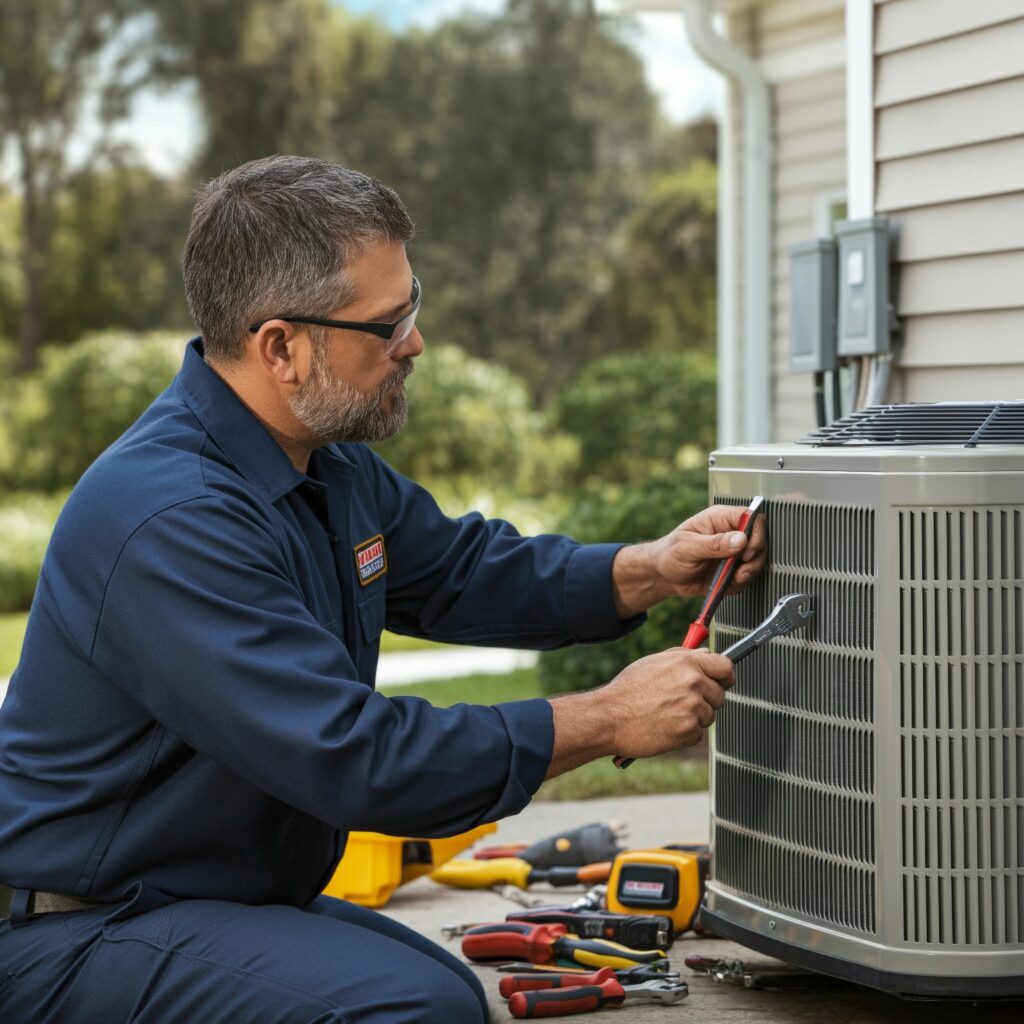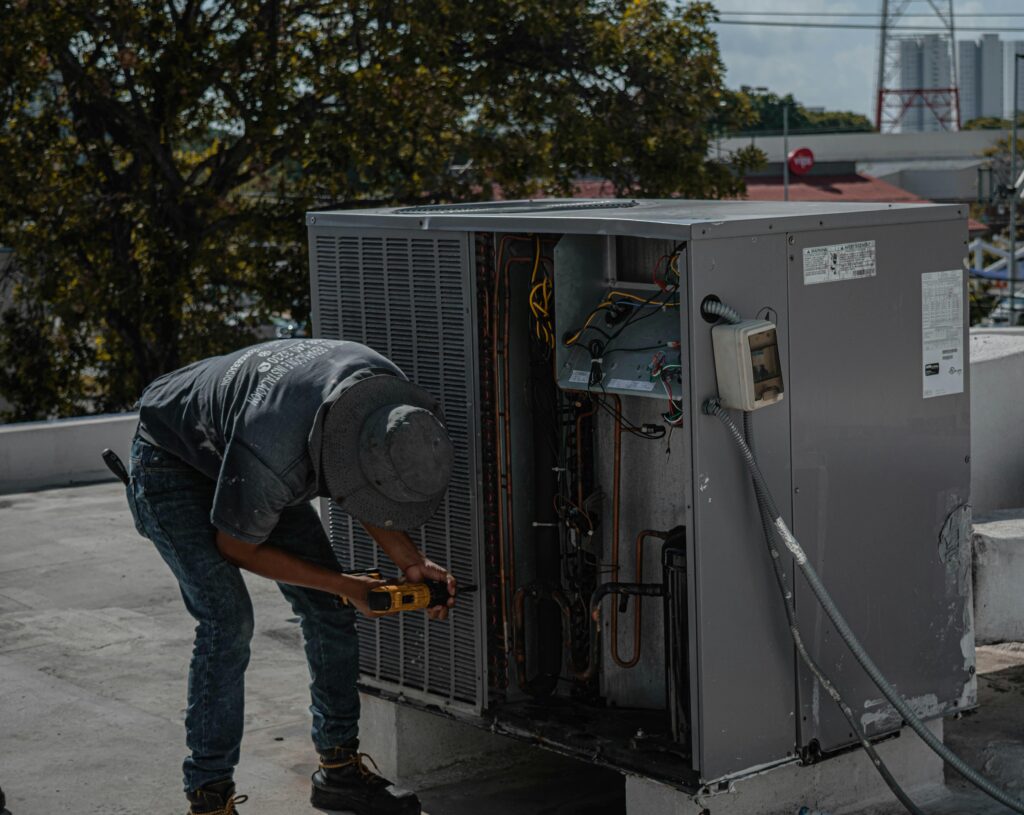Heating, ventilation, and air conditioning (HVAC) technicians play a crucial role in maintaining and repairing systems that regulate temperature, air quality, and humidity in residential, commercial, and industrial environments. If you’re considering a career as an HVAC technician, this guide will provide insights into the required training, qualifications, the rigor of the curriculum, job opportunities, and tips on how to start your own HVAC business.
HVAC Training and Certification
To become an HVAC technician, you need both formal education and practical hands-on training. Here’s a breakdown of the qualifications you’ll need to enter the field:
- Educational Requirements: Most HVAC technicians begin their career by earning a high school diploma or a GED. Courses in physics, math, and electronics can be particularly helpful since HVAC systems involve a deep understanding of electrical circuits, airflow, and temperature control.
- HVAC Programs: After high school, aspiring HVAC technicians typically enroll in a formal training program at a community college, technical school, or trade school. These programs often award certificates or associate degrees upon completion. The coursework covers a range of topics, including:
- Fundamentals of heating, cooling, and refrigeration
- Electrical systems and controls
- Blueprint reading
- Installation, maintenance, and repair of HVAC systems
- Energy efficiency principles
- Understanding environmental regulations (such as the Clean Air Act)
- Safety protocols
- These programs generally last between 6 months and 2 years, depending on the specific course load and the level of certification or degree earned.
- EPA Certification: The Environmental Protection Agency (EPA) requires all HVAC technicians working with refrigerants to be certified under Section 608 of the Clean Air Act. There are four levels of certification based on the types of equipment a technician works with, ranging from small appliances to commercial HVAC systems. Most training programs prepare students for this exam.
- Apprenticeship: Many technicians opt to complete an apprenticeship, which combines on-the-job training with classroom instruction. Apprenticeships typically last 3 to 5 years and are offered by employers, unions, or trade organizations. This hands-on training is invaluable because it provides real-world experience under the guidance of experienced HVAC professionals.
- Other Certifications: Beyond EPA certification, technicians may pursue additional credentials to demonstrate specialized knowledge in areas like energy efficiency, indoor air quality, or system design. Organizations like North American Technician Excellence (NATE) offer certifications that can boost your career prospects.
How Hard Is HVAC School?

The curriculum in an HVAC training program is both demanding and comprehensive, requiring a blend of theoretical knowledge and hands-on skills. The coursework can be quite rigorous due to the complexity of HVAC systems, the constant evolution of technology, and the need to understand both mechanical and electrical components.
- Technical Skills: HVAC systems involve intricate machinery, electrical circuits, and refrigerants that require precise handling. As a student, you’ll need to develop a strong understanding of how to troubleshoot and repair different systems. Courses in thermodynamics, fluid mechanics, and electrical theory demand a good grasp of math and science concepts.
- Practical Application: The physical nature of the job means that you’ll be working with your hands constantly, installing and repairing heavy equipment in sometimes uncomfortable conditions (hot attics, cold basements, or outdoor sites). Lab work and field training help students develop the necessary dexterity and stamina to succeed in the role.
- Regulatory Knowledge: HVAC technicians must also stay up-to-date with regulations concerning energy efficiency and environmental protection. This means that students will spend time learning about federal, state, and local codes, and they’ll need to pass certification exams to prove their competence in these areas.
Where Can I Find HVAC Schools?
From a pipeline perspective, the most HVAC technicians in the United States are generally produced by Community Colleges and Private For-Profit Colleges, with Hands-On Training Programs (e.g., apprenticeships) also contributing significantly but in a different context.
Here’s a breakdown by group by the percentage of students that become HVAC technicians:
Community Colleges: 40-50%
- Large Volume: Community colleges produce a significant share of HVAC technicians due to their affordability, wide accessibility, and state funding.
- Wide reach: These schools tend to serve local communities and offer both degree and certification programs.
- Flexible options: Many students attend part-time or take night classes, which adds to their appeal.
- Largest pipeline: Community colleges tend to produce a large number of HVAC technicians because they offer affordable, accredited programs that are widely accessible.
- Associates Degrees & Certifications: Many community colleges offer 1-2 year programs leading to associate degrees or certificates, preparing students for certification exams like the EPA 608.
- High Volume: These programs often serve local communities, and some states have networks of colleges that produce a significant portion of HVAC technicians (e.g., California, Texas).
- Cost-effective: The relatively low cost of community colleges attracts many students.
Private For-Profit Colleges: 30-40%
- Private For-Profit Colleges: 30-40%
- Significant contribution: Private for-profit institutions are strong players, aggressively recruiting students and offering shorter, career-oriented programs.
- Fast entry into the workforce: Their shorter programs (6-12 months) are designed to quickly transition students into entry-level HVAC roles.
- Popular schools: Examples like Lincoln Tech, Universal Technical Institute (UTI), and Fortis College contribute significantly to this percentage.
- Specialized training focus: Private for-profit institutions like Lincoln Tech, UEI College, and Universal Technical Institute (UTI) have HVAC programs that tend to be more specialized and focused on fast-tracking students into the workforce.
- Shorter Program Duration: These programs are often shorter, sometimes lasting less than a year, allowing students to get into the field more quickly.
Hands-On Training (Apprenticeships and Trade Unions): 10-20%

- Smaller overall volume: Apprenticeships and trade unions produce fewer HVAC technicians in absolute numbers but emphasize highly skilled training.
- Longer duration: Apprenticeships typically last 3-5 years but often guarantee job placement upon completion.Invaluable skill-building: While smaller in number, the technicians produced through apprenticeships tend to have deep, practical knowledge, making them highly sought after in the workforce.
- On-the-job learning: While this group may produce fewer technicians in sheer numbers compared to the other categories, it still plays a crucial role. Many HVAC technicians learn through apprenticeship programs, which combine paid, hands-on training with classroom instruction.
- Trade Unions: HVAC unions like the United Association (UA) offer robust apprenticeship programs that provide hands-on training while working, often at no cost to the apprentice. These programs are longer (typically 4-5 years) but produce highly skilled technicians.
- Demand-Driven: Apprenticeship programs are often tied directly to the needs of local contractors and industries, so they have a high job placement rate.
These percentages are general estimates and can vary by state or region based on the availability and popularity of each training option. For example, in states with strong union presence, the percentage of HVAC technicians trained via apprenticeships might be higher. Similarly, some regions with a strong network of community colleges might lean more toward that group for producing technicians.
Job Opportunities in the HVAC Industry
Are HVAC jobs in demand? Simple answer is yes, they are! The HVAC industry offers a wealth of job opportunities across various sectors. The demand for skilled HVAC technicians is expected to grow in the coming years, making it a lucrative and stable career choice.
- Growth Prospects: According to the U.S. Bureau of Labor Statistics, employment for HVAC mechanics and installers is projected to grow 5% from 2022 to 2032, faster than the average for all occupations. The increasing complexity of HVAC systems, as well as the need to replace older systems with more energy-efficient models, drives this demand.
- Industries and Sectors: HVAC technicians are needed in a variety of settings, from residential homes to large commercial buildings and industrial plants. Many work for construction companies, repair and maintenance businesses, or in the service departments of large organizations. Others choose to specialize in fields like refrigeration or energy management systems.
- Salary Expectations: HVAC technicians enjoy competitive salaries, with the median annual wage being around $50,000. Experienced technicians or those with specialized certifications can earn even more, particularly if they work on large commercial systems or in areas with high demand for skilled labor.
- Advancement Opportunities: With experience and continued education, HVAC technicians can advance to roles such as project managers, supervisors, or even engineers. Many also choose to start their own HVAC businesses, a path that offers both independence and increased earning potential.
4. Should You Start an HVAC Business After You Graduate?

Starting your own HVAC business can be a rewarding endeavor, offering both financial independence and the opportunity to build something of your own. Here’s a step-by-step guide on how to go about it:
- Gain Experience: Before launching your own business, it’s important to have several years of experience in the field. This will give you the necessary technical skills, business contacts, and a deep understanding of customer needs.
- Create a Business Plan: A solid business plan is the foundation of any successful company. Your plan should cover:
- The services you’ll offer (installation, repair, maintenance, etc.)
- Your target market (residential vs. commercial clients)
- Startup costs (equipment, vehicles, insurance, tools, office space)
- Marketing strategies (online presence, local advertising, partnerships with contractors)
- Financial projections (pricing structure, profit margins, expected revenue)
- Obtain Licensing and Insurance: Depending on where you plan to operate, you may need a state or local license to run an HVAC business. You’ll also need liability insurance to protect your company from lawsuits or damage claims. Some states require HVAC contractors to hold specific certifications, such as a contractor’s license.
- Invest in Equipment: You’ll need a range of tools and equipment to provide HVAC services. This includes diagnostic tools, repair equipment, and vehicles to transport you and your team to job sites.
- Build Your Team: As your business grows, you may want to hire additional technicians, office staff, and salespeople. Hiring certified technicians who are licensed and trained will help ensure your business provides high-quality services.
- Market Your Services: Building a strong customer base is key to running a successful business. Use online platforms, word-of-mouth referrals, and partnerships with local businesses to expand your reach. A user-friendly website, customer reviews, and social media presence can also help you attract more clients.
Become an HVAC Technician
Becoming an HVAC technician is a fulfilling career path that offers stability, growth, and the potential to branch out into business ownership. With proper training, hands-on experience, and a willingness to stay updated on new technologies and regulations, you can build a successful and rewarding career in this essential field. Whether you choose to work for an established company or start your own HVAC business, the opportunities in this growing industry are abundant.

1 thought on “Should You Become an HVAC Technician?”